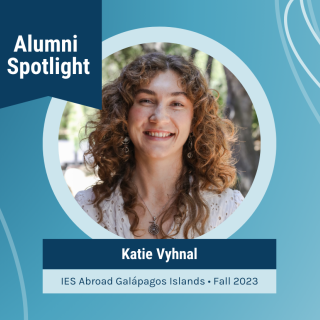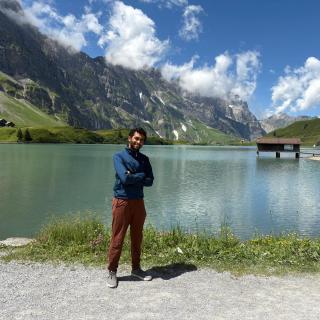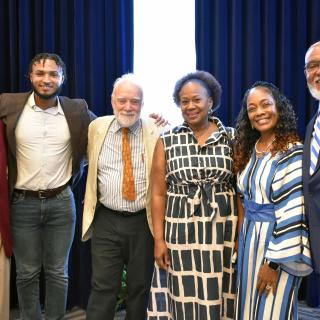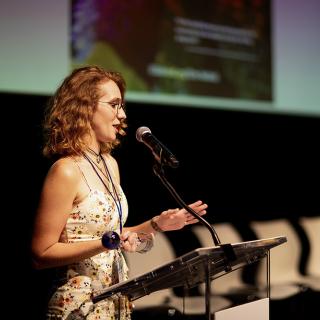 We’re proud to introduce Neal McKinney (Barcelona | Fall 2007), as our June Alum of the Month! In honor of LGBT Pride Month, we asked Neal to open up on his experiences studying abroad in Barcelona as a queer student. In this interview, Neal discusses his favorite study abroad memories and shares what advice he has for queer students who are thinking of studying or interning abroad.
We’re proud to introduce Neal McKinney (Barcelona | Fall 2007), as our June Alum of the Month! In honor of LGBT Pride Month, we asked Neal to open up on his experiences studying abroad in Barcelona as a queer student. In this interview, Neal discusses his favorite study abroad memories and shares what advice he has for queer students who are thinking of studying or interning abroad.
Neal is currently the Assistant Director of Off-Campus Study at DePauw University (his alma mater), and also co-leads a queer youth of color affinity group at Indiana Youth Group, a state-wide, non-profit centered on supporting the lives of LGBTQ+ youth in Indiana. Read on to learn about why Neal chose to study abroad in Barcelona, and how his experiences there helped him gain a better sense of self.
IES Abroad: Why did you choose to study abroad in Barcelona?
Neal McKinney: I chose Spain as a region because it was often talked about in my Spanish classes, and the city became a dream location for me. I ended up in Barcelona more so because the courses offered aligned with my remaining academic credit needs, but I quickly learned how much more it offered.
IES Abroad: Did you come out while studying abroad? If so, how did Spain and your study abroad experience influence that decision?
NM: I was out long before studying abroad in Spain, but I will say that Barcelona gave me more liberated opportunities to explore and define my sexuality beyond racialized contexts found in the U.S. gay culture. I gained a better sense of self because I was not having to deal with negative racial stereotypes when it came to interacting with Spanish gay men and other international gay men.
IES Abroad: Did you find queer friends while studying abroad? Was it easier or harder than you anticipated?
NM: I did develop a few queer friendships while abroad with local Spaniards, all of whom helped me understand more nuances of Spanish culture in particular and its intersections with LGBTQ+ issues in Spain.
It was definitely a bit difficult at first, more so because I was not comfortable speaking Spanish constantly and had a lot to learn as far as vocabulary, but once that lessened, I was able to be more confident in making friendships.
IES Abroad: What were some of your most memorable study abroad experiences?
 NM: I truly appreciated living with a host family because I enjoyed the meaningful discussions around the dinner table, where we discussed local and U.S. socio-culture and politics (this was during the Bush era) completely in Spanish, as well as learning various colloquial phrases like que fuerte or vale la pena.
NM: I truly appreciated living with a host family because I enjoyed the meaningful discussions around the dinner table, where we discussed local and U.S. socio-culture and politics (this was during the Bush era) completely in Spanish, as well as learning various colloquial phrases like que fuerte or vale la pena.
I also have some great memories of time spent with the amazing friends I made in my program that are still lasting today (which makes nearly 10 years) and a number of trips we took to Madrid, Rome, Venice, and to local towns around Barcelona, such as Sitges and Figueres (where Salvador Dalí was born and died).
I also came to value the shift in global perspective I gained in terms of understanding the role of the United States in influencing a lot of other nation’s economies (which, at that time, did not truly dawn on me). This made me more attuned to the international news cycle more than ever before.
Lastly, I did fall quite hard for one of my Spanish friends, who was such a kind and caring individual that went out of his way to introduce me to gay subculture beyond the stereotypes of the clubs and bars. He took me to LGBTQ+ bookstores, social clubs, not-for-profits, as well as invited me to visit his hometown of Colonia Güell (where architect Antoni Gaudí built an unfinished crypt/church that incorporated all of his famous architectural innovations). I gained so much from our short, but meaningful time together, and we are still in contact.
IES Abroad: What is the most difficult part about being queer while studying abroad?
NM: I think it depends on where you are studying abroad, how you identify, and how your identities are (not) accepted in that location. I think I struggled the most with having the confidence to pursue gay spaces in Barcelona on my own because the majority of my friend group identified as straight women.
There is a lot that you can potentially risk in terms of vulnerability to go beyond what’s comfortable and, in some cases, safe, especially if you’re abroad in a country where English isn’t the first language; however, doing so can also allow you to have opportunities to go beyond the surface level of the typical study abroad experience.
IES Abroad: Have you been back to Barcelona? How has the city changed?
NM: I have been back once in 2011. The city had changed quite a bit in terms of infrastructure – many building developments that were in the works, such as the Sagrada Famalia, were much closer to being completed. I could also tell that much of the immigrant populations that used to occupy areas such as El Raval had been replaced by gentrification – which I saw somewhat in 2007, but it was really apparent in 2011.
IES Abroad: What advice would you give to queer students who are thinking of studying or interning abroad?
NM: I would tell a student to think about what sort of support they might need and what sort of circumstances they wish to pursue while abroad, and let that guide them on where they want to study or intern abroad. I think it can be very challenging if you have not had much exposure outside of the United States to know exactly everything you need, but if you’re traveling to a location where there is a language barrier, LGBTQ+ individuals are not affirmed, or you happen to be one of the few (if not the only) queer students in your program, it can be isolating to navigate where to find support abroad.
There are plenty of things that can be done to mitigate this, however. Reaching out to see if there are any former LGBTQ+ students who went to your location is the best resource (an unprompted shout out to IES Abroad’s Ambassador Program), as well as doing Google searches for local organizations or services is very helpful. Also, in this era of technology, it is much easier to connect to people around the world via social media, so long as it is done so with care.
Thank you, Neal!
How will studying abroad redefine your world? We can’t wait to find out. Check out all of our Alum of the Month profiles to see real examples of how study abroad changed the lives of our former students.





